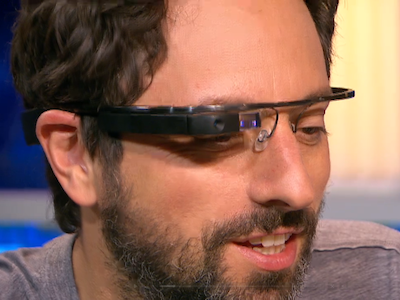Google Co-Founder Says Smartphones Are ''Emasculating''
Google Glass requires less rubbing, Sergey Brin suggests.
On Wednesday during the TED Conference in Long Beach, California, Google co-founder Sergey Brin, sporting the Google Glass headset, told a captive audience that he's still bothered by the use of smartphones, that they are somehow "emasculating". Users are standing around rubbing a featureless piece of glass, and apparently that's not very masculine.
Brin acknowledged that Google Glass also requires a little rubbing, but the current hardware has fewer features than most phones, thus less "rubbing" required. Google Glass also has the upper hand because there will always be a camera ready to snap a picture by a mere voice command – rubbing is not required.
The point he was seemingly trying to make is that the ideal search technology would surface information before the user even asks for it. He's been working on that problem for the last 15 years, and Google Glass is the first form factor that can truly deliver on that vision. He's also spent the last two years fine-tuning the actual physical design, describing the original vision as a "cell phone strapped to your head".
The Google Glass camera has been the source of concern for privacy groups for some time. During CES 2013, Vuzix even relayed a similar concern it was facing regarding its competing product, the Smart Glass M100. Like Google Glass, it features a camera that allows users to quietly take pictures without the typical obvious motions used with smartphones.
According to the Vuzix rep, there are social aspects to consider when launching "smart glasses" such as secretly recording video, walking in public areas using the device, actually driving a car with the headset in place and so on. Reception for the Smart Glass M100 has been outstanding, the rep said, but the company needs to do more research and come up with a suitable marketing strategy.
Brin recently told CNN that Google Glass will have an automatic picture-taking mode, allowing the user to snap pictures at preset intervals like every five seconds. Later a Google representative said that not every Google Glass unit will automatically record an image at preset intervals, as the first wave of Google Glass units will not ship with the auto-photo function.
Still, how would you like to look at a person what has a wearable camera pointing in your face? Creepy, right? "Basically everyone with Google Glass will have a Closed Camera Television on their head, (CCTV) and have the ability to broadcast their 'vision' to the world," one consumer questions on Google's product forums. "What if someone does not feel comfortable being broadcasted nationally?"
Get Tom's Hardware's best news and in-depth reviews, straight to your inbox.
Brin's TED Conference presentation arrives as Google wraps up its application submittal window for an "Explorer" edition of Google Glass. This pilot program will be the last chance non-developers will be able to get their hands on the specs until they supposedly go on sale for under $1500 USD by the end of the year.

Kevin Parrish has over a decade of experience as a writer, editor, and product tester. His work focused on computer hardware, networking equipment, smartphones, tablets, gaming consoles, and other internet-connected devices. His work has appeared in Tom's Hardware, Tom's Guide, Maximum PC, Digital Trends, Android Authority, How-To Geek, Lifewire, and others.
-
WhyFi A) How can he say that smart phones are emasculating with that crap hanging off his face?Reply
B) When did TED become a marketing platform? -
freggo As much as I like Google, but does he really think these glasses look 'macho' ?Reply
Seriously...
-
The_Trutherizer He cannot really get around the fact that Glass is geeky. But then I'm geeky so I would get one if it was not for the fact that I wear specs and do not like contacts. Somehow I feel that this may well turn into a major fad that could go the way of the moon bag once it loses any fashion appeal. At some point at least you will get tech that can convert any existing set of specs or shades into a device with similar function. That will be maturity.Reply -
ajrm Imagine what Batman could do with this.. like in "Dark Knight" using all of Gotham's phones to track Joker.. This will take it to a whole new level..Reply -
cats_Paw And why would i care what he thinks? :D.Reply
I dont even have a phone! (yep, in these crazy times, no phone :D). -
acadia11 Man who would have thunk the world would infact end up , just like Serial Experiments Lain.Reply
